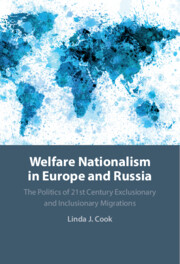 Welfare Nationalism in Europe and Russia
Welfare Nationalism in Europe and Russia Concepts, Cases, and Overview of the Book’s Argument
from Part I - Introduction
Published online by Cambridge University Press: 14 November 2024
Chapter 1 lays out the book’s argument about the rise and sources of welfare nationalism. It explains the significance of the study in focusing on migration issues that are major sources of contemporary political and humanitarian crises and shows ‘how we got here’ – how these crises have built since the 1990s in Europe and Russia. The chapter explains the book’s key concepts: welfare nationalism, exclusion and inclusion, and populism, and sets the study within the literature on international migration and welfare. It focuses on the key role of ethnicity and the importance of political elites and mass media in influencing responses to migration and identifies contrasting cycles: Exclusionary migrations involve a “vicious cycle” of hostile public opinion toward more-or-less ethnically distant migrants that is reinforced and exploited by politicians for enhanced influence, amplified by mass media, and produces policies of exclusion. By contrast, inclusionary migrations involve a “virtuous cycle” of relatively receptive public opinion toward ethnically close migrants, high-level political support, elites’ management of nationals’ grievances, and positive treatment in mass media, producing policies of inclusion. The conclusion provides an overview of the book’s structure and a summary of each chapter.
To save this book to your Kindle, first ensure [email protected] is added to your Approved Personal Document E-mail List under your Personal Document Settings on the Manage Your Content and Devices page of your Amazon account. Then enter the ‘name’ part of your Kindle email address below. Find out more about saving to your Kindle.
Note you can select to save to either the @free.kindle.com or @kindle.com variations. ‘@free.kindle.com’ emails are free but can only be saved to your device when it is connected to wi-fi. ‘@kindle.com’ emails can be delivered even when you are not connected to wi-fi, but note that service fees apply.
Find out more about the Kindle Personal Document Service.
To save content items to your account, please confirm that you agree to abide by our usage policies. If this is the first time you use this feature, you will be asked to authorise Cambridge Core to connect with your account. Find out more about saving content to Dropbox.
To save content items to your account, please confirm that you agree to abide by our usage policies. If this is the first time you use this feature, you will be asked to authorise Cambridge Core to connect with your account. Find out more about saving content to Google Drive.